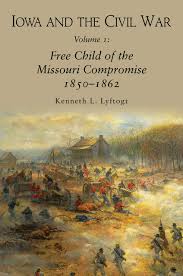
Kenneth Lyftogt is the winner of the 2019 A. M. Pate, Jr. Award in Civil War History for his book Iowa in the Civil War; Volume 1: Free Child of the Missouri Compromise 1850-1862. This well researched and beautifully written work was the clear winner of the Award which focuses on new books written about the Trans-Mississippi sector of the Civil War. There were 8 other candidates for the Award.
Iowa became a State in 1846 as the first “free” addition to the United States from the Missouri Compromise. By 1850 it had a substantial population and much of that population was anti-slavery. (In fact, John Brown lived in Iowa before going to Harper’s Ferry.) Many Iowans enlisted in the Union Army. The Iowa units and their commanders took part in many engagements in the Trans-Mississippi including Wilson’s Creek and Pea Ridge. This Volume covers their participation in these battles as well as Fort Donelson and Shiloh.
But the book is not just a summary of battles. It is also the story of the social and political history of the state during this period. Drawing on many first person accounts, letters and diaries, Lyftogt is able to convey what it was like to be “there.” As he says in his introduction, “Iowa voices are some of the most eloquent and pertinent of the war. I have tried, as much as possible, to simply allow them to tell their stories.”
Kenneth Lyftogt is a retired lecturer in the Department of History at the University of Northern Iowa. He is the editor of Left for Dixie: The Civil War Diary of John Rath, and the author of Blue Mills to Columbia: Cedar Falls and the Civil War and Iowa’s Forgotten General: Mathew Mark Trumbull and the Civil War.
Here is what Drew Wagenhofer of Civil War Books and Authors has to say about the book:
“Written in a popular narrative style, Free Child of the Missouri Compromise 1850-1862 succeeds in conveying to readers the nature of Iowa’s political transformation during the 1850s, and it very fruitfully explores the state’s many important contributions to the Union war effort on both sides of the Mississippi during the first year of the war. Numerous prominent Iowa civilian and military leaders not widely known or appreciated in the general literature are also usefully profiled in the study. The trilogy is off to a solid start, and the next two volumes will be highly anticipated.”